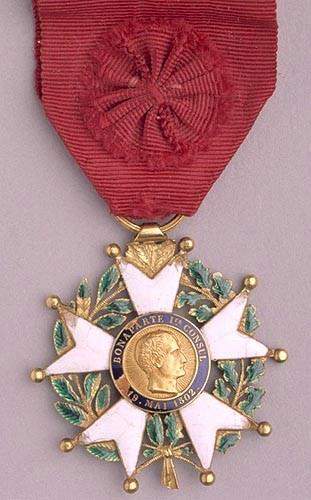
1 minute read
Peter/Petrus Rene Pauli
1792—1884
Legion of Honour, officially National Order of the Legion of Honour, French Ordre National de la Légion d’honneur, premier order of the French republic, created by Napoleon Bonaparte, then first consul, on May 19, 1802, as a general military and civil order of merit conferred without regard to birth or religion provided that anyone admitted swears to uphold liberty and equality.

True to the stated ideals of Napoleon when founding the order, the membership of the Legion is remarkably egalitarian; both men and women, French citizens and foreigners, civilians and military personnel, irrespective of rank, birth, or religion, can be admitted to any of the classes of the Legion. Admission into this order, which can be extraordinary military bravery and service in times of war. Admission into the Legion for war services automatically carries with it the award of the Croix de Guerre, the highest French military medal.
Peter Pauli proudly wore a similar medal on special occasions while living in the Roxbury area.
“
In the Catholic cemetery at Roxbury are buried three men, soldiers in the wars of Napoleon Bonaparte. Their names were Numiere [this is the son of Joseph Neumaier Sr. who was a Napoleonic soldier, and never came to America. This son did not fight in the war], Polly [Pauli] and Class [Klaes]. Numiere was under Blucher fighting against Napoleon, while Polly and Class fought under Napoleon on the plains of Waterloo against Wellington. Blucher coming up at night effected the overthrow of Napoleon. Polly wore the star of the Legion of Honor on his breast as one of Napoleon’s guards. The writer saw him while living at the age of ninety. He stood six feet, straight as an arrow. Mr. Class went at the age of fifteen as a substitute for his brother, who had a family, and served until the down fall of Napoleon. Being at the home of his daughter, I went out to where her father was dressing the grape vines. There stood the man who had shouted ‘Victory’ and suffered defeat on the blood-red fields of Spain, one of the army that crossed the Niemen 500,000 strong to invade Russia, one of the number who stormed the Russian entrenchments at Borodine, fighting uncovered in the open plain, causing Napoleon to exclaim at St. Helena, ‘You immortal heroes.’ He saw the burning of Moscow, the greatest conflagration of modern times lived and fought through that fearful retreat.”
Excerpt Source: Lodi Valley News by James R. Steele in 1896.
It should be emphasized that as stated in the 1896 article above, Joseph Neumaier Sr. never actually came to America. The author of the article, James Steele, erroneously assumed that the Joseph Neumaier Jr. who is buried in St. Norbert's Cemetery, was the Napoleon soldier. He was the son of the Neumaier who fought with Napoleon.








